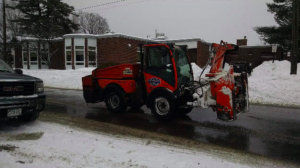Who Chooses when UMF closes for a Snow Day?
By Aislinn Forbes Contributing Writer
Already this year, the UMF campus has had two cancellations because of dangerous weather, but the student and staff on campus don’t seem to know who is actually responsible for making those decisions.
Through an email interview, Administrative Specialist Amy Perrault wrote that if classes will be delayed or cancelled, the alert will be sent no later than 6:15 AM. “It is difficult to track down the one responsible for a storm closure,” said Perrault. “Because the decision is a committee decision and does not land solely on one person to make the call.”
The committee takes into account more than just forecasts. The members monitor road closures throughout the night and early morning, weather warnings, and local contacts, including Mt. Blue High School. It is impossible to confirm these methods with any of the committee members directly because only a select few know who they are.
“It’s one the hardest jobs on campus,” wrote Perrault. “The committee members are a well-guarded secret.”
Professors likely don’t know either so they are following the same procedures as the students. At least, Professor of History, Allison Hepler is.
Hepler commutes from Woolwich to Farmington three days a week, leaving at 3:30 AM in order to arrive on campus by 5:00. Often, weather will be different at her home on the coast than in Farmington, so she often has to play the odds.
“If I’m here the night before and it’s iffy, I will prevail on one of my friends and stay over,” said Hepler. “I have sometimes stayed overnight thinking that there’s no way they’ll cancel school, and I get to work at 5:00 and then my phone dings at quarter to six.”
Along with Hepler, Jeff Mckay, the Director of Facilities, and his team are also on campus in the early mornings. McKay oversees between four and twelve people responsible for campus clean up during and after storms. They are often on campus by three or four in the morning. “We always plan as if we are going to open,” said McKay.
There is a reason that the decision isn’t made earlier. According to Professor Pamela Mitchell, forecasts can be pretty accurate when it comes to location of storms in the 12-24 hours before they arrive. “I think that forecasting the exact amount of snowfall is pretty difficult and this is where there seems to be some inaccuracy,” said Mitchell.
McKay is someone who monitors the weather separately from the committee and knows that large storms, especially, require a lot of planning. “If we had a storm coming tomorrow,” said McKay, “we would have already been planning yesterday.”
Despite the hard work, the decisions aren’t always perfect. Allison Bernier, a Senior and a commuter from Livermore Falls, had to miss class on Tuesday Nov. 13th because of weather. “I didn’t want to skip class,” said Bernier. “But it wasn’t worth it to put myself in danger.”
It was a day that began with quickly falling snow, the sticky kind that gets stuck in tire treads. Mitchell said, “Second most dangerous (weather for drivers) is wet snow, which facilitates hydroplaning.”
That Tuesday, UMF did not delay classes despite the fact that Mt. Blue had announced a delay, and Spruce Mountain High School had cancelled school all together. Bernier recalls seeing someone off the road as she attempted to drive into Farmington.
Conditions were dangerous enough that Campus Police issued a warning to students crossing the road to Scott Hall. It reads, “Give cars and especially trucks extra time to stop before attempting to cross. They are having a hard time making the hill by Scott Hall on Main Street.” This warning was posted at 10:19 a.m.
Commuting students shouldn’t feel pressured to make a dangerous trip if the weather is unexpected. “I tell students, you use your own judgement,” said Hepler.
“Students need to make decisions on their own based on how safe they feel,” agreed McKay. “We certainly wouldn’t want the fact that we’re open to be the determining factor
